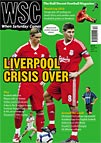 Following the demise of Setanta, there is a reluctance to spend big on matches that draw small viewing figures. So does the future involve sitting in front of a computer? Andy West reports
Following the demise of Setanta, there is a reluctance to spend big on matches that draw small viewing figures. So does the future involve sitting in front of a computer? Andy West reports
The subject of live online streaming rose to prominence with the internet-only showing of England’s World Cup qualifier in Ukraine, opening up the question of how strongly the internet’s presence will be established in the sports broadcasting market. In years to come, will international fixtures be exclusively shown by online media as a matter of routine? Or was the lack of TV coverage of the Ukraine clash a one-off occurrence borne out of a unique set of circumstances (Setanta’s demise, England’s early qualification and an unsociable 5.15pm kick-off)? Fans who missed out on the Ukraine game will be relieved to learn that the latter seems to be the case.
At the centre of the debate is a current review of which sporting events should be “listed” and reserved exclusively for terrestrial broadcasters – the so-called “crown jewels” which presently includes the Olympics, Wimbledon and the World Cup finals but crucially not qualifying fixtures, which can be sold on the open market. The independent review panel, chaired by former FA chief executive David Davies, is expected to announce its recommendations to the government in the next few weeks. The Department for Culture, Media and Sport will then study the findings before deciding whether to amend the identity of the listed events for the first time in more than a decade.
Predictably, the BBC and ITV are insisting that World Cup and European Championship qualifiers should be added to the list of protected events, and it’s understood that Davies has responded favourably to their promptings. To put it simply: if Davies’s panel recommends the adoption of the BBC and ITV suggestions and the government agrees, all future competitive international fixtures will be broadcast live on terrestrial TV.
That would be great news for fans of the home nationa, who would be secure in the knowledge that free TV access to their team’s matches is guaranteed. It would be even better news for the BBC and ITV, who would no longer have to enter expensive bidding wars with subscription-based broadcasters like Sky Sports before securing the rights.
The chief losers would be these broadcasters, who would somewhat harshly be prevented from entering the bidding for some of sport’s most valuable properties, and the FA, who would see the commercial value of their fixtures plummet with only two realistic bidders permitted. Although they have not commented publicly, the already debt-laden FA is believed to be strongly against the imposition of an artificial restriction upon the sale of their rights. They are expected to urge the government to ignore Davies’s recommendations and keep qualifiers off the list of protected events, while Sky will argue against the artificial impediment of their competitive rights
So what will happen? On the one hand, following the recent media storm surrounding the TV blackout of the Ukraine game (and with a general election looming), adding qualifiers to the protected list would be an extremely popular step for the government to take.
On the other hand, making such a bold move would go against the grain of the non-interventionist policies that have been consistently pursued in recent years. If there’s been no state intervention in the increasing levels of dubious foreign ownership of clubs, the lack of Englishmen playing in our top flight or the excessive wages paid to players, then why should the government now get involved in the sale of TV rights?
For the last three decades, the government’s approach to sport has been to allow the free market to prevail; a succession of ruling parties have shown no inclination to get involved in the governance of football. Will that consistent strategy really be swept aside now to make easy political capital out of the televising of sporting events? And yes, that is a rhetorical question… would the government take advantage of a golden opportunity to court public favour in the build-up to a general election? Of course it would, so we can expect it to happen.
To return to the original point, where does this leave the internet? As technology continues to improve and digital communication plays an even more central role in our daily lives, it seems highly likely that more and more football fixtures will be streamed live online. Indeed, Perform (the digital media specialists who streamed the Ukraine game) already broadcast dozens of games every month through its tie-ups with various betting companies.
It may soon be the case that smaller, less commercially desirable competitions or one-off fixtures will be broadcast exclusively online – the Conference is a prime candidate for an internet-only deal, while the FA broadcast the first round Cup tie between Oldham and Leeds on their website after failing to sell the package that Setanta previously held. So there’s every chance that lower-profile international friendlies could be available exclusively online too.
But with major events of national significance and real commercial value such as the Premier League or competitive international games, the anticipated alteration to the listed events would ensure that internet streaming could only happen in addition to, rather than instead of, television coverage. The Ukraine game only became a web exclusive due to a lack of interest from broadcasters, who were unwilling to meet the asking price for a one-off game when England had already qualified. In terms of major matches, those circumstances were unique, and are unlikely to arise again.
From WSC 274 December 2009